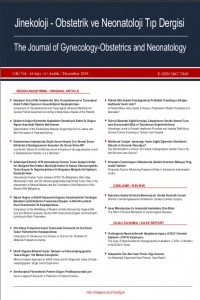İnsan Mikrobiotası ve Jinekolojik Hastalıklara Olan Etkisi
Öz
İnsan vücudu on binlerce mikroorganizmaya ev sahipliği yapar. Deri, ağız, vajina, gastro-intestinal sistem, üriner sistem, hatta yakın geçmişe kadar steril olduğu düşünülen plasenta ve akciğer çeşitli mikroorganizmaları barındırır. Geçtiğimiz 20 yılda, hastalıklara ve immün sistem restorasyonuna bakış açısını değiştiren iki önemli proje ortaya çıkmıştır: İnsan Genom Projesi (İGP, Human Genome Project-1990-2003) ve İnsan Mikrobiom Projesi (İMP, Human Microbiome Project-2008-2012). Bu çalışmaların da etkisi ile insan mikrobiotasının birçok hastalığın ortaya çıkışında önemli role sahip olduğu gösterilmiştir. Özellikle vajinal, gastro-intestinal ve üriner mikrobiotanın jinekolojik hastalıklar üzerinde önemli etkileri bulunmaktadır. Bu derleme insan mikrobiotasının jinekolojik hastalıkların oluşumu üzerine etkileri ve bu etkinin proflaksi, destek ve tedavi amaçlı nasıl kullanılabileceğini araştırmayı amaçlamaktadır.
Anahtar Kelimeler
İnsan Gen projesi Jinekolojik hastalık Mikrobiota Probiyotik
Kaynakça
- 1.Schwiertz A, Studying the Human Microbiota. In: Schwiertz A, Volker R, Microbiota of the Human Body.2nd ed. Switzerland : Springer, 2016: 5-153 2. Danielsson D, Teigen PK, Moi H, The genital econiche: focus on microbiota and bacterial vaginosis. Annals of the New York Academy of Sciences 2011; 1230(1): 48-58.
- 3. Lewis FMT, Bernstein KT, Aral SO, Vaginal Microbiome and Its Relationship to Behavior, Sexual Health, and Sexually Transmitted Diseases. Obstetrics & Gynecology 2017; 129(4): 643-654
- 4. Green KA, Zarek SM, Catherino WH, Gynecologic health and disease in relation to the microbiome of the female reproductive tract. Fertility and sterility 2016; 104(6): 1351-1357
- 5. Schneeweiss J, Koch M, Umek W, The human urinary microbiome and how it relates to urogynecology. ınternational urogynecology journa 2016; 27:1307-1312
- 6. Tremellen K, Pearce K, Dysbiosis of Gut Microbiota (DOGMA)–a novel theory for the development of Polycystic Ovarian Syndrome. Medical hypotheses 2012; 79(1):104-112
- 7. Baker JM, Al-Nakkash L, Herbst-Kralovetz MM, Estrogen-gut microbiome axis: Physiological and clinical implications.Maturitas 2017;103:45-53 8. Arumugam M, Raes J, Pelletier E, Le Paslier D, Yamada T, Mende DR et al. Enterotypes of the human gut microbiome. Nature 2011; 473(7346):174.
- 9. Lindheim L, Bashir M, Munzker J, Trummer C, Zachhuber V, Leber B et al. Alterations in Gut Microbiome Composition and Barrier Function Are Associated with Reproductive and Metabolic Defects in Women with Polycystic Ovary Syndrome (PCOS): A Pilot Study. PLoS One 2017; 12(1): e0168390
- 10. Kelley ST, Skarra DV, Rivera AJ, Thackray VG, The gut microbiome is altered in a letrozole-induced mouse model of polycystic ovary syndrome. PloS one 2016; 11(1): e0146509.
- 11. Ridlon JM, Ikegawa S, Alves JMP, Zhou B, Kobayashi A, Iida T et al. Clostridium scindens: a human gut microbe with a high potential to convert glucocorticoids into androgens. Journal of lipid research 2013; 54(9): 2437-2449
- 12. Griffin C, Probiotics in obstetrics and gynaecology. Aust N Z J Obstet Gynaecol 2015; 55(3):201-9
- 13. GuoY, Qi Y, Yang X, Zhao L, Wen S, Liu Y et al. Association between polycystic ovary syndrome and gut microbiota.PloS one 2016; 11(4): e0153196
- 14. Laschke MW,Menger MD, The gut microbiota: a puppet master in the pathogenesis of endometriosis? Am J Obstet Gynecol 2016; 215(1): 68-4.
- 15. Moreno I, Franasiak JM, Endometrial microbiota—new player in town. Fertility and Sterility 2017; 0015-0282
- 16. Sanders ME, Guarner,F, Guerrant R, Holt PR, Quigley EMM, Sartor RB et al. An update on the use and investigation of probiotics in health and disease. Gut 2013; 62(5):787-796.
- 17. Mitchell C, Marrazzo J, Bacterial vaginosis and the cervicovaginal immune response. American Journal of Reproductive Immunology 2014;71(6): 555-563.
- 18. Tamburini S, Shen N, Wu HC, Clemente JC, The microbiome in early life: implications for health outcomes. Nature medicine 2016; 22(7): 713-722.
- 19. Martin DH, Marrazzo JM, The Vaginal Microbiome: Current understanding and future directions. The Journal of infectious diseases 2016; 214: 36-41.
- 20. Muzny CA, Schwebke JR, Pathogenesis of bacterial vaginosis: discussion of current hypotheses. The Journal of infectious diseases 2016; 214: 1-5.
- 21. Mirmonsef P, Spear GT, The barrier to HIV transmission provided by genital tract Lactobacillus colonization. American Journal of Reproductive Immunology 2014;71(6): 531-536.
- 22. Lokken EM, Balkus JE, Kiarie J, Hughes JP, Jaoko W, Totten PA, et al. Association of Recent Bacterial Vaginosis With Acquisition of Mycoplasma genitalium. American journal of epidemiology, 2017; 186(2):194-201.
- 23. Walther-António MR, Chen J, Multinu F, Hokenstad A, Distad TJ, Cheek EH et al. Potential contribution of the uterine microbiome in the development of endometrial cancer. Genome medicine 2016; 8(1):122.
- 24. Muhleisen AL, Herbst-Kralovetz MM, Menopause and the vaginal microbiome. Maturitas 2016; 91: 42-50.
- 25. Moreno I, Codoñer FM, Vilella F, Valbuena D, Martinez-Blanch JF, Jimenez-Almazán J et al. Evidence that the endometrial microbiota has an effect on implantation success or failure. American Journal of Obstetrics & Gynecology 2016; 215(6): 684-703.
- 26. Reid G, Dols J, Miller W, Targeting the vaginal microbiota with probiotics as a means to counteract infections. Current Opinion in Clinical Nutrition & Metabolic Care 2009;12(6): 583-587.
Ayrıntılar
| Birincil Dil | Türkçe |
|---|---|
| Konular | Kadın Hastalıkları ve Doğum |
| Bölüm | Derleme |
| Yazarlar | |
| Yayımlanma Tarihi | 31 Aralık 2019 |
| Gönderilme Tarihi | 27 Aralık 2019 |
| Kabul Tarihi | 29 Aralık 2019 |
| Yayımlandığı Sayı | Yıl 2019 Cilt: 16 Sayı: 4 |

